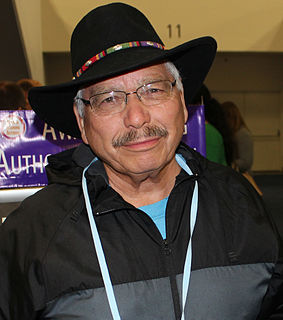A Quote by John Fire Lame Deer
Our beliefs are rooted deep in our earth, no matter what you have done to it and how much of it you have paved over. And if you leave all that concrete unwatched for a year or two, our plants, the native Indian plants, will pierce that concrete and push up through it.
Related Quotes
One human life is deeper than the ocean. Strange fishes and sea-monsters and mighty plants live in the rock-bed of our spirits. The whole of human history is an undiscovered continent deep in our souls. There are dolphins, plants that dream, magic birds inside us. The sky is inside us. The earth is in us.
The environment is everything that makes up our surroundings and affects our ability to live on the earth - the air we breathe, the water that covers most of the earth's surface, the plants and animals around us, the overall condition of our planet, and much more. Protecting the environment is really important to everyone's welfare - that of our children, as well as that of the future generations.
Today, about 40 percent of America's carbon pollution comes from our power plants. There are no federal limits to the amount those plants can pump into the air. None. We limit the amount of toxic chemicals like mercury, and sulfur, and arsenic in our air and water, but power plants can dump as much carbon pollution into our atmosphere as they want. It's not smart, it's not right, it's not safe, and I determined it needs to stop.
You told me once of the plants that lie dormant through the drought, that wait, half-dead, deep in the earth. The plants that wait for the rain. You said they'd wait for years, if they had to; that they'd almost kill themselves before they grew again. But as soon as those first drops of water fall, those plants begin to stretch and spread their roots. They travel up through the soil and sand to reach the surface. There's a chance for them again.
And I thanked mi papa who'd always said to me that we, los Indios, the Indians, were like the weeds. That roses you had to water and giver fertilizer or they'd die. But weeds, indigenous plants, you gave them nada-nothing; hell you even poisoned them and put concrete over them, and those weeds would still break the concrete.
The writing I have in mind and sometimes indulge in myself is concerned, not with plants, mountains or birds as items of scientific description, but with experiences of nature that impinge upon our moods and emotions, enrich our imagination and reveries, and shape our sense of how we stand in relation to the environing world. In a broad sense of the term, this kind of writing is an exercise in phenomenology, an attempt to render the significance that birds, plants or whatever have for us.































